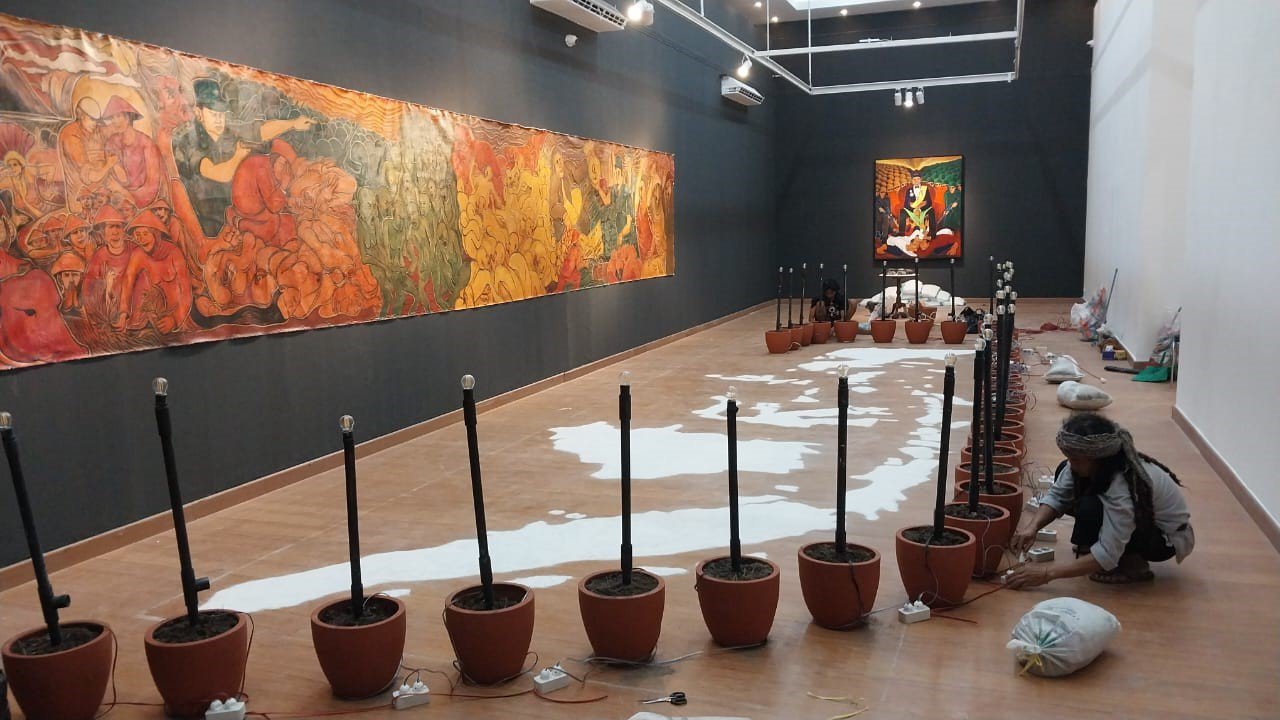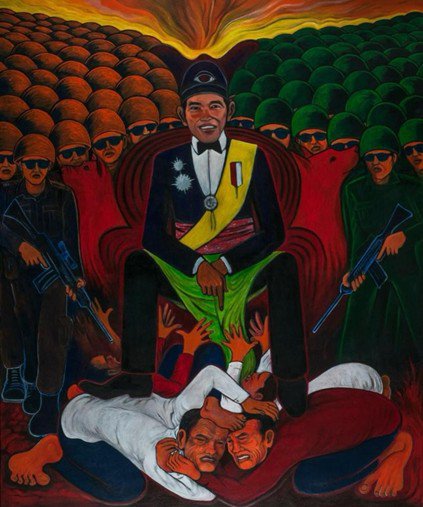Postponing Censorship? Contentious Positions that Undermine the Museum as a Space for Artistic Freedom

On 19 December 2024, the Galerie Nasional Indonesia (Galnus) cancelled the opening of the solo exhibition of Yos Suprapto titled, Revival: Land for Food Sovereignty, initially curated by Suwarno Wisetrotomo, on the same day the exhibition was publicly announced to be opened. Yos Suprapto (Born October 25, 1952, Surabaya, Indonesia) is an Indonesian artist and activist known for making socially-engaged art. This exhibition was a culmination of 15 years of the artist’s research into the issue of soil degradation, starting from the former Indonesian President Suharto’s period of military dictatorship, known as the New Order regime (1966 to 1998), to the present-day affecting food sovereignty in Indonesia. His artistic intention was to present the history of soil degradation through over 30 paintings as a form of historical record, which included large mural-sized paintings of 10 meters in length and an installation. The exhibition shares the possibilities of how indigenous systems of knowledge of the land, previously ignored could be harnessed to revive microorganisms that can potentially be a solution to the environmental problem. All the paintings and installation come together to convey the story of how soil degradation has become a threat to food sovereignty in Indonesia, the fourth most populated country in the world. The exhibition would have included educational programs, that could serve a public conversation through visually arresting images drawn from the aesthetics of muralism, and the functional application of science through the artist’s decades long research into ways to improve soil conditions.
A few days prior to the opening of the exhibition, Suwarno Wisetrotomo resigned as the curator of the show. According to reports by multiple art magazines like ArtReview, Suwarno asserted that 2 paintings in the exhibition did not align with the theme of the exhibition, serving only to express the personal politics of the artist. Suprapto agreed to cover the 2 paintings identified by Suwarno with a black cloth. However, 3 additional paintings were subsequently added to the list of paintings that could not be shown, which the artist could not agree with as removing these would have compromised the artistic integrity of the entire exhibition. After not arriving a way forward between the artist and the curator, he chose to resign, while also stating that his resignation was not intended to result in the cancellation of the exhibition. Confusion over the reasons for the cancellation of the exhibition deepened when Galnus, stated that the exhibition was not cancelled but postponed, as reported by the online media Jakarta Globe. The reason given by the institution laid in the lack of understanding between the artist and the curator over the removal of the 5 paintings, while emphasising that there was no interference from the government.
The possibility of interference from the government has been discussed in both local and international media, as the paintings in question depict the former Indonesian President Jokowi Widodo, being complicit in the marginalization of farmers and agriculture. What is equally concerning is how the artist's voice is muted, when he questions the overwhelming drive for economic development, manifested in mega infrastructural projects all over Indonesia without sufficient consideration to environmental and ecological needs that have compromised the country’s food sovereignty. More importantly, the public is deprived of the opportunity to share, debate, and engage in conversations on how the Indonesian society can work in solidarity to protect their land.

The pressure on artistic expression that informed the whole situation was exacerbated by the unclear reasons for the additional 3 paintings to be removed from the exhibition. The lack of clarity on whether the exhibition was postponed or cancelled raises the issue of how ‘postponing’ an exhibition, may evolve into a basis of eventual cancellation becoming a form of censorship, leveraging on the passage of time for this incident to fade out into distant memory.
Regardless of whether Suprapto’s exhibition is indefinitely postponed or cancelled, the spectre of censorship looms, artistic freedom has been limited, and the museum as an increasing vulnerable space for the freedom of expression globally is further undermined. Museum Watch is greatly concerned with the development of the events and urges for institutional transparency, alongside promoting and preserving museums as spaces of artistic freedom, critical thinking, and dialogue.
Yos Suprapto has been contacted for comment. The Galerie Nasional Indonesia (National Gallery of Indonesia) was repeatedly contacted for their comments but received no response.
The CIMAM Museum Watch Committe:
- Zeina Arida, (Chair) Director, Mathaf: Arab Museum of Modern Art, Doha, Qatar.
- Bart De Baere, Director, M HKA Museum of Contemporary Art Antwerp, Belgium.
- Amanda de la Garza, Artistic Deputy Director, Museo Nacional Centro de Arte Reina Sofía (MNCARS), Madrid, Spain.
- Malgorzata Ludwisiak, Ph.D., Museum Management Expert / Freelance Curator / Academic Teacher, Warsaw, Poland.
- Agustin Perez Rubio, Independent Curator, Madrid, Spain.
- Kitty Scott, Strategic Director, Fogo Island Arts / Shorefast, Toronto, Canada.
- Yu Jin Seng, Director (Curatorial & Research), National Gallery Singapore, Singapore.
CIMAM – International Committee for Museums and Collections of Modern Art – is an Affiliated Organization of ICOM.